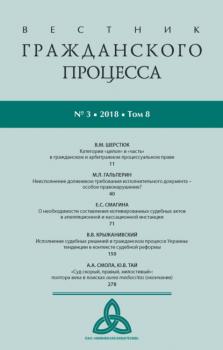Группа авторов
Список книг автора Группа авторовВестник гражданского процесса № 6/2018 (Том 8)
В научно-практическом журнале «Вестник гражданского процесса» представлены материалы практической направленности, связанной с деятельностью судебной системы России и иностранных государств. Содержание журнала составляют статьи по вопросам гражданского процесса, арбитражного процесса, исполнительного производства, третейского производства, другим проблемам цивилистического процесса. Основные рубрики журнала: Проблемы гражданского процесса Гражданский процесс в комментариях История гражданского процесса Иностранный гражданский процесс Трибуна молодого ученого Судебная власть и практика Personalia Периодичность выхода журнала – три раза в полугодие. Журнал «Вестник гражданского процесса» включен в Перечень ведущих рецензируемых научных журналов и изданий, в которых должны быть опубликованы основные научные результаты диссертаций на соискание ученой степени доктора и кандидата юридических наук.
Вестник гражданского процесса № 5/2018 (Том 8)
В научно-практическом журнале «Вестник гражданского процесса» представлены материалы практической направленности, связанной с деятельностью судебной системы России и иностранных государств. Содержание журнала составляют статьи по вопросам гражданского процесса, арбитражного процесса, исполнительного производства, третейского производства, другим проблемам цивилистического процесса. Основные рубрики журнала: Проблемы гражданского процесса Гражданский процесс в комментариях История гражданского процесса Иностранный гражданский процесс Трибуна молодого ученого Судебная власть и практика Personalia Периодичность выхода журнала – три раза в полугодие. Журнал «Вестник гражданского процесса» включен в Перечень ведущих рецензируемых научных журналов и изданий, в которых должны быть опубликованы основные научные результаты диссертаций на соискание ученой степени доктора и кандидата юридических наук.
Вестник гражданского процесса № 4/2018 (Том 8)
В научно-практическом журнале «Вестник гражданского процесса» представлены материалы практической направленности, связанной с деятельностью судебной системы России и иностранных государств. Содержание журнала составляют статьи по вопросам гражданского процесса, арбитражного процесса, исполнительного производства, третейского производства, другим проблемам цивилистического процесса. Основные рубрики журнала: Проблемы гражданского процесса Гражданский процесс в комментариях История гражданского процесса Иностранный гражданский процесс Трибуна молодого ученого Судебная власть и практика Personalia Периодичность выхода журнала – три раза в полугодие. Журнал «Вестник гражданского процесса» включен в Перечень ведущих рецензируемых научных журналов и изданий, в которых должны быть опубликованы основные научные результаты диссертаций на соискание ученой степени доктора и кандидата юридических наук.
Вестник гражданского процесса № 3/2018 (Том 8)
В научно-практическом журнале «Вестник гражданского процесса» представлены материалы практической направленности, связанной с деятельностью судебной системы России и иностранных государств. Содержание журнала составляют статьи по вопросам гражданского процесса, арбитражного процесса, исполнительного производства, третейского производства, другим проблемам цивилистического процесса. Основные рубрики журнала: Проблемы гражданского процесса Гражданский процесс в комментариях История гражданского процесса Иностранный гражданский процесс Трибуна молодого ученого Судебная власть и практика Personalia Периодичность выхода журнала – три раза в полугодие. Журнал «Вестник гражданского процесса» включен в Перечень ведущих рецензируемых научных журналов и изданий, в которых должны быть опубликованы основные научные результаты диссертаций на соискание ученой степени доктора и кандидата юридических наук.
Вестник гражданского процесса № 2/2018 (Том 8)
В научно-практическом журнале «Вестник гражданского процесса» представлены материалы практической направленности, связанной с деятельностью судебной системы России и иностранных государств. Содержание журнала составляют статьи по вопросам гражданского процесса, арбитражного процесса, исполнительного производства, третейского производства, другим проблемам цивилистического процесса. Основные рубрики журнала: Проблемы гражданского процесса Гражданский процесс в комментариях История гражданского процесса Иностранный гражданский процесс Трибуна молодого ученого Судебная власть и практика Personalia Периодичность выхода журнала – три раза в полугодие. Журнал «Вестник гражданского процесса» включен в Перечень ведущих рецензируемых научных журналов и изданий, в которых должны быть опубликованы основные научные результаты диссертаций на соискание ученой степени доктора и кандидата юридических наук.
Вестник исполнительного производства № 1/2020
Научно-практический журнал «Вестник исполнительного производства» предполагает совмещение отечественной и зарубежной доктрин исполнительного производства и одновременное их сочетание с материалами практической направленности. Содержание журнала составляют интересные статьи, затрагивающие наиболее актуальные вопросы, относящиеся к сфере исполнительного производства. Основные рубрики журнала: Вопросы защиты имущественных прав Актуальные вопросы исполнительного производства Зарубежный опыт в сфере исполнительного производства История развития института судебных приставов в России Практика применения действующего законодательства Дознание и административная практика в Федеральной службе судебных приставов Периодичность выхода журнала – 4 номера в год. Для сотрудников Федеральной службы судебных приставов (ФССП), Минюста, судов, банков, а также других организаций, осуществляющих работу с проблемными долгами.
Вестник исполнительного производства № 4/2019
Научно-практический журнал «Вестник исполнительного производства» предполагает совмещение отечественной и зарубежной доктрин исполнительного производства и одновременное их сочетание с материалами практической направленности. Содержание журнала составляют интересные статьи, затрагивающие наиболее актуальные вопросы, относящиеся к сфере исполнительного производства. Основные рубрики журнала: Исполнительное производство и гражданско-правовая защита нематериальных прав Практические вопросы осуществления исполнительного производства Административное право и практика администрирования Принудительное исполнение и зарубежная юрисдикция Вопросы модернизации исполнительного производства Исполнительное производство и финансовое управление Вопросы несостоятельности (банкротства) Периодичность выхода журнала – 4 номера в год. Для сотрудников Федеральной службы судебных приставов (ФССП), Минюста, судов, банков, а также других организаций, осуществляющих работу с проблемными долгами.
Вестник исполнительного производства № 3/2019
Научно-практический журнал «Вестник исполнительного производства» предполагает совмещение отечественной и зарубежной доктрин исполнительного производства и одновременное их сочетание с материалами практической направленности. Содержание журнала составляют интересные статьи, затрагивающие наиболее актуальные вопросы, относящиеся к сфере исполнительного производства. Основные рубрики журнала: Современное исполнительное производство Дознание в ФССП России Коллекторская деятельность Конкурс научных работ Федеральной службы судебных приставов Периодичность выхода журнала – 4 номера в год. Для сотрудников Федеральной службы судебных приставов (ФССП), Минюста, судов, банков, а также других организаций, осуществляющих работу с проблемными долгами.









